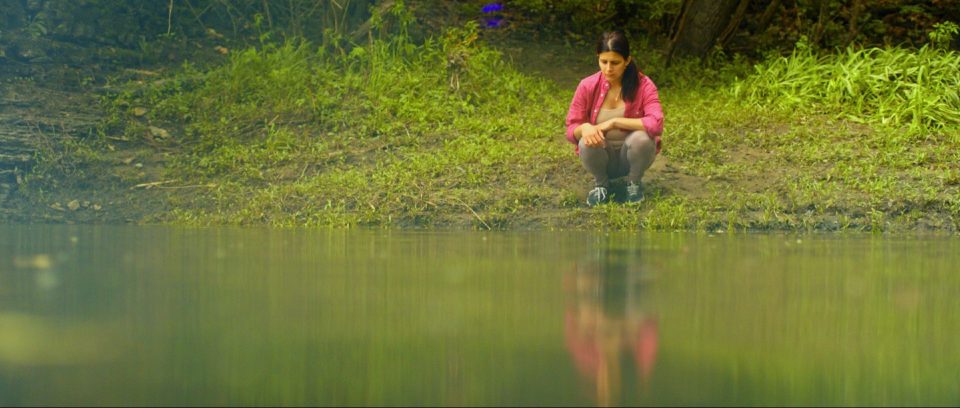Urwa Zubair’s film Silver Cord, speaks volumes about the constant state of wonderment that we are in with regards to the afterlife. In this vast universe, being mere specks of life on a planet called earth, we somehow still have such a strong connection to the entirety of this realm we exist within. “We live in our small neighborhoods, inhabitants of a small town, in a small country, on such a small planet in such a vast universe, or what we in Urdu, call ‘Kainaat’. Our knowledge as human beings is very limited.”

Silver Cord refers to the delicate thread that tethers our body to our soul. It is the fine line that our soul walks between life and death and upon speaking to Urwa with regards to the film she shared with us her inspiration behind wanting to talk about the afterlife.

“The inspiration to talk about the afterlife just comes from the curiosity about the unknown in the world. I think that we as human’s, come into this world and develop a tunnel-vision. How many times do we really just sit back and think about the enormity of this universe or what is the purpose of our existence?”

Admittedly, we don’t really spend a lot of time thinking about our purpose in life and this film helps us realize that things need to change.
She speaks a universal truth when she says, “We keep worrying and fussing about things like ‘What’s going to happen if I take that job?’ or ‘What will happen if I move to that city?’ and we forget to think about what will happen after we die. Death is the only reality that none of us can shake off. We will all die one day but until then I’m afraid all we can do is speculate upon what may happen, when that happens.”
To explain her belief on the matter of silver cord and what it represents we spoke with her about what she believes in relation to our body and soul in this world and the hereafter and this is what she had to share with us.
“We are all made in two’s I believe, the body, that everyone else can see and the soul, that nobody else can see, it is unseen, untouched and something that is purely me. When we die the physical body will be buried within this land and be forgotten but our soul will transcend into the afterlife. I saw a painting in an exhibit where I saw two women sitting in a train with their foreheads joined together to each other. You’d think they were romantically involved but I felt like they were the same person. That’s what we are as the body and soul.
Silver Cord speaks about a very sensitive subject that many people tend to not touch upon because of their lack of knowledge or rather a fear of the unknown. Upon speaking to her about how she thought this film would be received from a social and religious standpoint, she was clear on the fact that the research for this film, although was approached from an Islamic viewpoint with her being Muslim, does not impact the fact that this concept is not limited to any one religion but is universal in nature, that every human being can relate to and understand.
Without dishing out any spoilers we would like to touch upon the idea of filming underwater. The underwater aspect stems from a story of a little girl, which is the first thing you see in the film. It relates to the concept of “Barzakh”, which is the state of transcendence, between life and death.
Urwa as a film maker tends to touch upon topics that we as humans may choose not to delve into. Although she knows that as a creator of an art form meant for an audience, she needs to keep in mind what will be accepted by the society, however she says “When we talk about filmmakers like Scorsese, Nolan or David Lynch, we are taught that as artists, we are not to create what the audience wants to see as what the audience wants, is constantly evolving and changing.”
Staying true to this approach her film Bani, an upcoming feature, attempts to bind the generation gap and the misunderstood cultural and traditional practices in Muslim countries while shedding light on issues such as suppression and gender inequality.
She believes in creating something that she as a film maker is passionate about, that encourages the change that she wants to project into the world around her. Keeping that thought process in mind she has tried to talk about suppression, pressure and inequality, that is clearly persistent in our culture without painting Pakistani traditions and culture in a negative light. Her way of showcasing this story not only helps us to understand both sides of conflict, but significantly humanizes them so that her audience can really delve deep into the crux of the problem on a personal and communal level.
Although the story of Bani is inspired by real life events, the game plan is not to villainize anyone or to create a division between the two genders but more of an exploration of generation gap and the shift in the thinking and perception between our generation and that of our parents with the goal of understanding both sides. Pertaining to the portrayal of suppression, Urwa steers clear of any justifications for the ordeal that women, on the most part, have to suffer through. This piece speaks volumes in terms of the yin and yang of both perspectives though, maintaining the stance that there is no damsel in distress nor is there a villain, but merely two sides to the same coin, or maybe two warriors fighting the same battle in their own respective ways.
“Bani, I would say, is essentially a love story of a father’s love for his daughters, who were forced to grow up too soon. It primarily connects to our humanity because to understand this concept, you don’t need to belong to a certain age bracket or gender but just be human. With the massive demand for content pertaining to the South Asian culture, I think the world is now tapping into that market and learning more about our culture and way of life. Although it is a drama piece, it is filled with subtle humor and keeps us constantly in a state of learning, with regards to what is going on in the world and also about ourselves.”
Silver Cord is set for festival release this year and we have no doubt it will be an astounding success across the board. Judging by the depth of the subject that Silver Cord depicts, we are excited to see what Bani, as an inimitable piece in itself, brings to the table.

